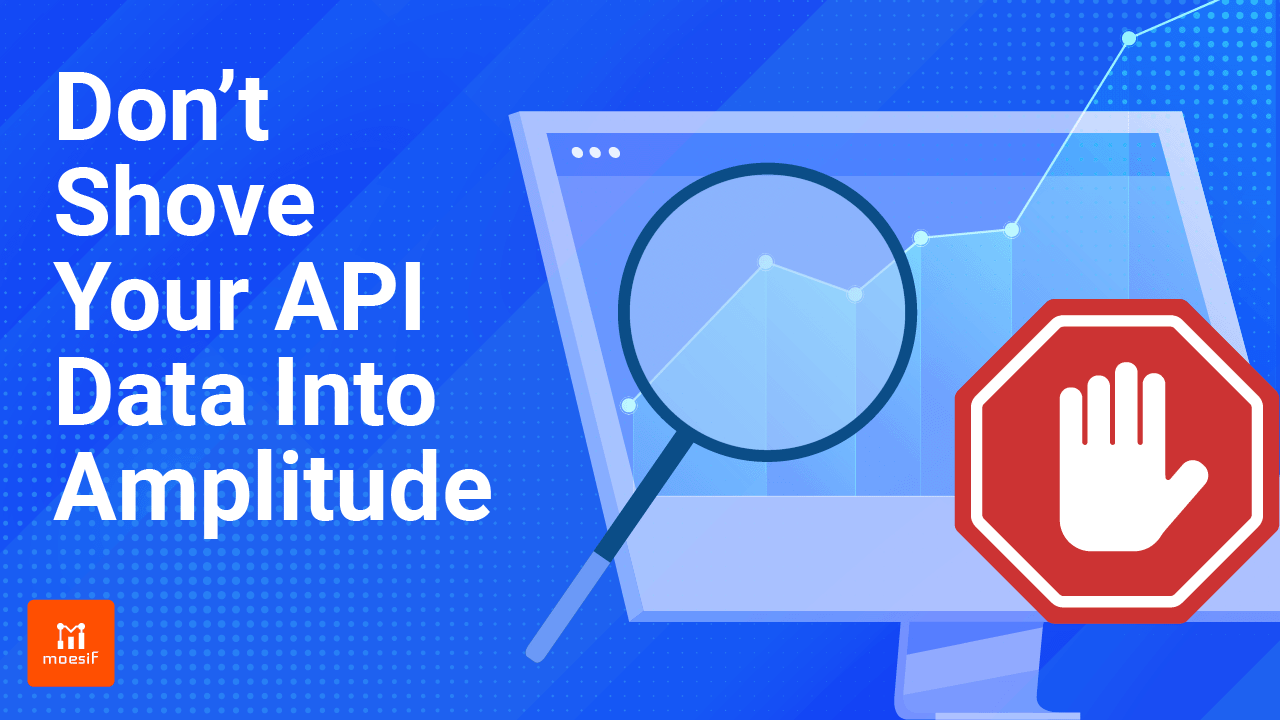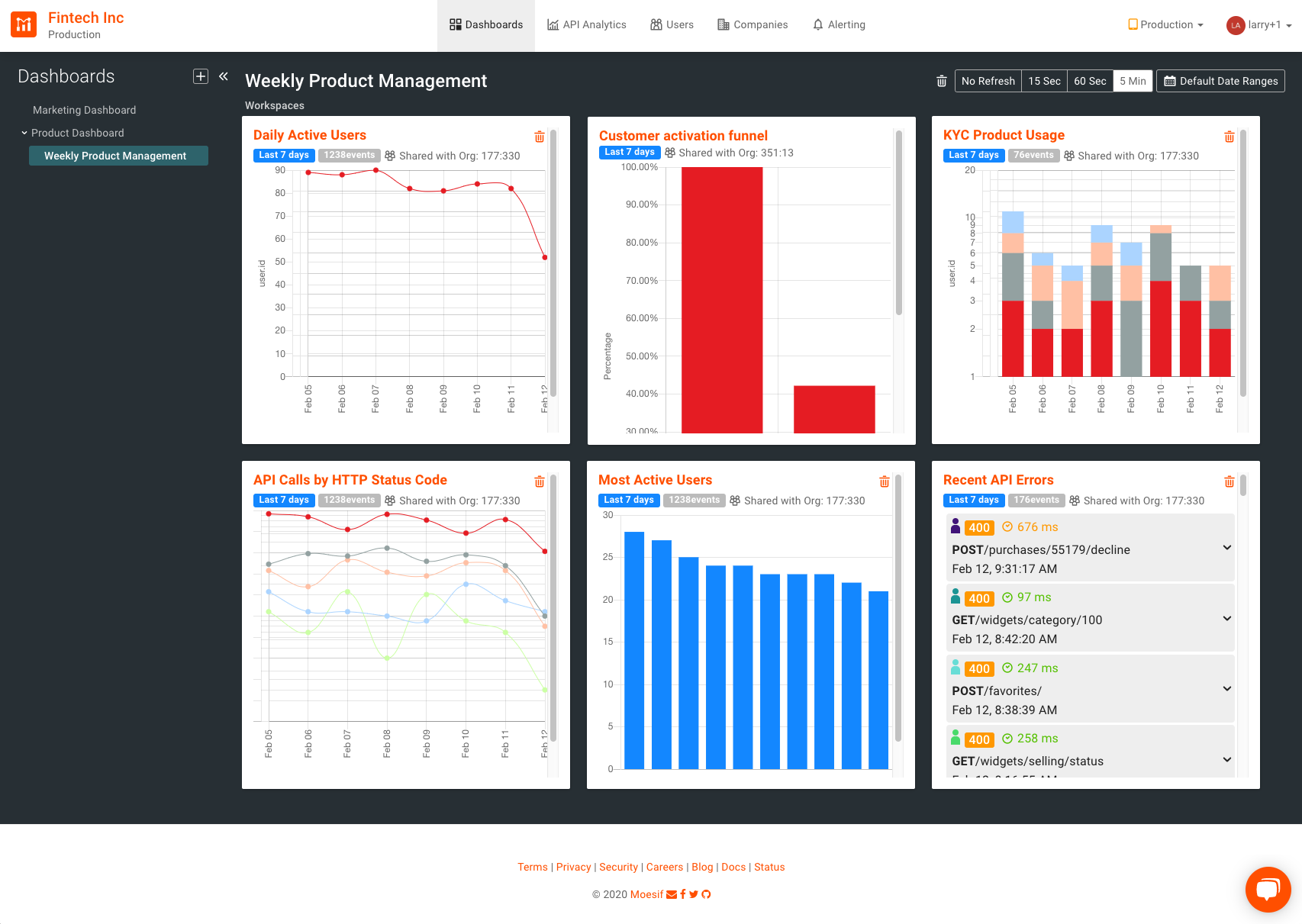Don’t Shove Your API Data Into Amplitude

It’s prudent business practice to only focus on your core features when getting to Minimum Viable Product (MVP). Microservices architectures allow you to outsource non-differentiated pieces of your solution to third-party providers; Use someone else for user management, billing and account management.
At first blush, it might seem attractive to develop your own API analytics solution, perhaps by building on top of a web analytics tool like Amplitude, MixPanel or Segment. But once you peel back the onion you’ll soon realize that you’ll be unnecessarily crippling your data analysis through upload limits, de minimis dimensional support and flawed visualization.
Use the right tool for the job and employ a best-in-case analytics solution, one that’s built exclusively for API products, like Moesif API Analytics.
Web Analytics is Very Different From API Analytics
Amplitude is great for tracking user journeys and analyzing real-time user interactions with a simple logEvent API call. When an Amplitude developer on boards onto the platform, some developers will try to use Amplitude as an all-encompassing, holistic platform for their analytics needs. However, during the implementation phase, developers will discover that the Amplitude platform has severe limitations when it comes to upload limits (batches/sec), limits for fields, universal analytics, dimensions, and scale. As a result of these limitations, developers will struggle to build their entire analytics solution on Amplitude and will need to purchase other solutions to fit their analytics needs.
Most importantly, Product Managers (PMs) and Product Marketing Managers (PMMs) need to report on KPIs but don’t necessarily have the development knowledge or technical resources to implement complex, self-reporting dashboards themselves. As a result, Amplitude can sometimes go unused in large organizations since KPI dashboards need to be customized on a business unit basis. With Moesif, all of the API/KPI data any PM or PMM could want is available in a simple drop-down menu interface. Understanding your analytics data is easier with a tool meant to visualize API use analytics. In this article, we’re going to cover why you shouldn’t shove your API data into Amplitude, rather consider a solution that’s custom built for APIs’ unique requirements. At the end of the day, website traffic and website analytics produce raw data that is vastly different from a data source like an API, so the tools you use for your API analytics need to be API focused.
Track your API Data Easily with Moesif
Amplitude’s customers join the platform envisioning that they’re going to have a seamless experience creating charts to track important KPIs and metrics data. However, once Amplitude is implemented, PMs and their development teams quickly discover that setting up charts to track those user behavior metrics is a tedious and manual job.
Out of the box Moesif enables your teams to track API metrics that are important to both your infrastructure and platform/marketing teams. Whether you’re in DevOps, Product Management, Application Engineering, or Growth, Moesif is designed to track the product analytics data that you care about. In Amplitude, your API data isn’t initially configured for you and your options for tracking individual user data or overarching company metrics is extremely limited. Moesif allows you to drive insights from detailed analytics with real-time data collection.
Here is a shortlist of metrics data that’s trackable out of the box with Moesif, and that would have to be custom created in Amplitude:
- API Usage Growth
- Unique API Consumers (API DAU and MAU)
- Top Customers by API Usage
- API retention
- Time to First Hello World (TTFHW)
- Uptime, CPU, and Memory Usage
- Request Per Minute (RPM), Average and Max Latency, Errors Per Minute
- Total number of unique visitors
The full rundown of top API metrics that your team should be tracking is detailed in a companion blog post.
With Moesif’s Saved Workspaces feature, teams can save reports and share them across their organization. Are there certain reports that only you want access to? Creating private dashboards is easy with Moesif, just modify your “Edit Sharing” settings on your Workspace and choose whether you want your Workspace to be Private, shared with your Team, or Public. To read more about this feature, click here.

Moesif vs Amplitude API Data Limitations
Amplitude has limitations on how many events can be triggered each month as well as how many events you can send per second, depending on the traffic source. Moesif has some limitations such as JSON payload size, however as you’ll be able to see from the table below, Moesif is more cost-effective and doesn’t require you to sign up for an expensive Enterprise plan to access more than 1000 events/sec. With Moesif’s Pay-As-You-Go pricing, you only pay for the events you use and Moesif will not block your requests if you exceed your allocated plan:
| Moesif | Amplitude | |
|---|---|---|
| Batch Size | 12MB | 20MB |
| Upload Limit | No Limit | 100 Batches/Sec and 1000 events/sec, more than 1000 events/sec requires an enterprise plan |
| Device Limit | No Limit | 2000 events per request and under 1MB |
| Request Limits | No Limit | 5 Concurrent Requests Across all REST API Endpoints |
| Event Type | No Limit | 2000 event types per project |
| Event Properties | No Limit | 2000 event properties per project |
| User Properties | No Limit | 1000 user properties per project |
With Moesif, there is no upper limit when it comes to API data tracking. Moesif allows developers to collect as many events as a customer wants to send. The infrastructure is designed around clusters and nodes that can be easily scaled on the fly. With Moesif, the load is balanced across multiple clusters/nodes which allows your API data to scale infinitely.
API Security and Scale with Moesif
Moesif has implemented top-of-the-line security into its platform and is fully GDPR and SOC 2 compliant. All API Tokens are signed using HMAC SHA-256 and Moesif’s SSL implementation received an A+ on the Qualsys’ SSL Labs Analysis, and all of Moesif’s SDKs and agents are configured to use HTTPS by default. With Moesif’s Secure Proxy, HIPAA compliance is seamless with on-prem client-side encryption and Bring Your Own Key (BYOK). These security features will enable you to implement Moesif in any industry or use case that you may need when tracking your API analytics.
API Analytics Management with Moesif vs Amplitude
As you can see, managing your API Analytics with Moesif enables your enterprise to innovate quickly, and enables your developers to build fully scalable and compliant analytics dashboards with ease. Moesif gives organizations the power to create robust dashboards that track common KPIs and metrics data customizable to your business’s needs. Additionally, Moesif doesn’t set arbitrary limits on your API usage because there’s no reason a single API request should be unaccounted for. Accurate data reporting is the foundation to building a strong, reliable business for your customers, and Moesif is excited to help you achieve those goals through our powerful API Analytics Platform. To learn more about Moesif and see a brief overview of how it works, check our introductory video.




